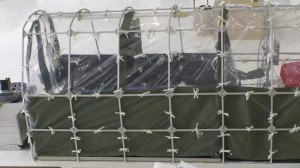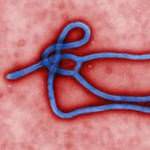Antibodies from survivors
Researchers consider using blood transfusions from Ebola survivors to pass antibodies into infected people, as no vaccines or drugs are approved yet. Dr. Peter Piot, director of London’s School of Hygiene and Tropical Medicine and co-discoverer of the virus:
This is something that’s fairly simple to do
WHO’s network of international blood regulators says there are thousands of survivors from past Ebola outbreaks in Africa. It says it has identified several patients as possible donors and the first batch of blood from survivors could be available later in the year, but adds:
[The] logistics of blood collection are an issue
Blood from donors must also be screened for other illnesses such as HIV and malaria before it can be used.
CDC sending 50 specialists
0 CommentsThe CDC is planning, over the next month, to send 50 epidemiologists, experts of health communication and other service personnel to Sierra Leone and Guinea, which are the hardest hit countries, amid increasing fears of the spread of the deadly Ebola virus to other countries. Dr. Tom Friednen, CDC director:
These individuals will help countries establish emergency operations centers that can develop a structured and effective way of addressing the outbreak.
Local superstitions
0 CommentsHealth officials say local superstitions are turning away patients from seeking medical care, worsening the outbreak. In Liberia’s Lofa county, health workers trying to screen two communities were chased away with knives and cutlasses, while in other communities Ebola is seen as a ‘curse’ for things like sexual promiscuity. A Red Cross volunteer says some patients favour traditional remedies such as bathing in salt water at midnight. UNICEF Ebola coordinator Fabio Friscia:
What is actually creating the greatest problem is the behavior of the population … It is absolutely something we could expect. The population is being attacked by an absolutely new disease no one [in western Africa] has ever seen before.
International medics evacuated
0 CommentsThe Ebola crisis in Liberia worsens after the evacuation of some international medics from Liberia following the infection of two US health workers with the Ebola virus. The overcrowded and understaffed Elwa hospital in the capital, Monrovia, where Kent Brantly and Nancy Writebol worked, has been forced to turn away some Ebola cases.
Given ZMapp
Brantly and Writebol are given ZMapp at the hospital in Liberia where they are being treated. After special permission is granted for the use of the untested medicine, the serum is sent from the U.S. stored at subzero temperatures, and must be allowed to thaw naturally for eight to 10 hours. They agree that Writebol will be given the first dose as Brantly is younger and expects to have a better chance of survival. However his condition worsens and he is intravenously administered Writebol’s thawed dose, after telling doctors that he thinks he is dying. Within an hour, his breathing eases and the red rash over his torso fades. Writebol is then given the medicine and requires a second dose, but also recovers.
Receives blood donation
0 CommentsBrantly receives a blood donation from a 14-year-old Ebola survivor in Liberia while awaiting ZMapp, the first person in the current Ebola outbreak to receive the treatment.
Doctor arrives in US
Brantly, one of the American victims of the Ebola Virus, is now receiving treatment at Grady Memorial Hospital in Atlanta. Brantly is the first ever patient to receive treatment for Ebola in the United States. Every precaution being taken in the care of the doctor who remains in isolation. His wife, Amber:
It was a relief to welcome Kent home today. I spoke with him, and he is glad to be back in the U.S. I am thankful to God for his safe transport and for giving him the strength to walk into the hospital.
Infected doctor and missionary evacuated
 Brantly and Writebol, a missionary, will fly back to US, as the Ebola outbreak is spreading too quickly. They will be flown on a jet which fitted with a tent designed for transporting patients with highly infectious diseases.
Brantly and Writebol, a missionary, will fly back to US, as the Ebola outbreak is spreading too quickly. They will be flown on a jet which fitted with a tent designed for transporting patients with highly infectious diseases.
WHO: Moving faster than efforts to control
0 CommentsAt a meeting in Guinea’s capital Conakry,WHO director-general Margaret Chan tells the presidents of Guinea, Liberia, Sierra Leone and Ivory Coast that the virus could be stopped, but cultural practices such as traditional burials were a significant cause of its spread. She also says that governments may need to restrict population movements and public gatherings, and use the police and civil defence forces to guarantee the security of response teams. She also says more than 60 medical workers have died, hampering efforts to tackle the disease.
This outbreak is moving faster than our efforts to control it. If the situation continues to deteriorate, the consequences can be catastrophic in terms of lost lives, severe socioeconomic disruption and a high risk of spread to other countries.
US to test vaccine
0 CommentsThe U.S. government will begin human testing on a Ebola vaccine as early as September, after seeing positive results from tests on primates, according to CNN and USA Today. The National Institutes of Health’s infectious disease unit is working with the U.S. Food and Drug Administration to put the vaccine into trial as quickly as possible.
‘National tragedy’
King’s Sierra Leone Partnership program director Dr Oliver Johnson of Connaught Hospital Freetown says Khan’s death is a national tragedy:
Dr Khan was widely known and respected for a long career and in leading the fight against Lassa fever. He’d become a real figurehead for the Ebola response so there’s a sense of deep sadness in what’s a very small community here in Freetown.
Dr Khan was friends with many of the senior doctors and nurses at Connaught Hospital, and was well known as a teacher for the medical students who were very sad yesterday, as well as the general public.
When the news first broke that he was sick, I think it added to fears amongst the many doctors and nurses about treating Ebola patients. People thought, if even Dr Khan can get sick, then any of us can get sick.
Umar Khan dies of Ebola
Khan dies after contracting Ebola. Chief medical officer Dr Brima Kargbo:
It is a big and irreparable loss to Sierra Leone as he was the only specialist the country had in viral haemorrhagic fevers.
Doctors without Borders:
His work and dedication have been greatly appreciated by the medical community in Sierra Leone for many years. He will be remembered and missed by many, especially by the doctors and nurses that worked with him. MSF’s sincere thoughts and condolences are with Dr. Khan’s family, friends and colleagues.
Liberia closes borders
0 CommentsLiberian president, Ellen Johnson Sirleaf, closes most of the country’s borders. Ebola testing centers have been opened in the few points of entry that still remain. Public gatherings and hotels have been also ordered to play a 5-minute video on Ebola safety. Sirleaf:
No doubt the Ebola virus is a national health problem. It attacks our way of life, with serious economic and social consequences. As such we are compelled to bring the totality of our national resolve to fight this scourge.
American doctor infected
Brantly diagnoses himself with Ebola virus while working with Ebola patients in Liberia. Brantly has body aches, pains and fever but is in a stable condition, says Ken Isaacs of North Carolina Samaritan’s Purse:
[The doctor] is not out of the woods yet, but we remain optimistic that he will survive.
The disease has killed at least 672 people in four West African countries since the outbreak began earlier this year in Guinea and spread to Liberia and Sierra Leone.
Fears for life
0 CommentsKhan tells the BBC that he fears for his life as he treats Ebola patients:
Health workers are prone to the disease because we are the first port of call for those with the disease. Even with the full kit we put on we’re at risk. I’m afraid for my life, because I cherish my life. And if you are afraid then you must take the maximum precautions, stay vigilant and stay on your guard.
Contracts virus
Khan contracts Ebola and is admitted to a Medecins Sans Frontieres treatment ward in Kailahun, Sierra Leone. Health Minister Miatta Kargbo:
[I will do] anything and everything in my power to ensure he survives.
Develops symptoms
0 0 reuben reuben2014-10-03 02:01:092014-10-03 02:01:09Develops symptomsWHO: drastic action needed
WHO calls for “drastic action” to fight the deadliest Ebola breakout on record and is convening an 11-nation meeting to address the crisis. 635 cases of haemorrhagic fever (most confirmed to be Ebola), including 399 deaths, have been reported across Guinea, Liberia and Sierra Leone, making this the larges breakout ever reported. Doctors Without Borders (MSF) said that the deadly outbreak of the virus is “out of control”.
Sierra Leone locks down
Sierra Leone declares a 4-day lockdown from the 18th to the 21st of September 2014. This is in a bid to tackle the Ebola outbreak in the country. The aim of the move is to allow health care workers to isolate new cases and prevent the disease from spreading further. Health workers will be given vaccines in November, after safety checks have been completed.
304 cases, 206 deaths
0 CommentsThe outbreak appears to have stabilised. In Guinea, five of the six prefectures where the outbreak occurred have no reported any more cases for almost a month while in Liberia no new cases have been reported since April 9. No confirmed cases are reported in Sierra Leone.

